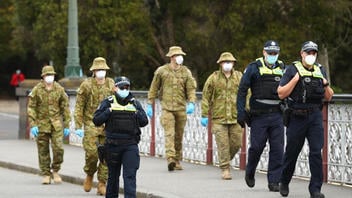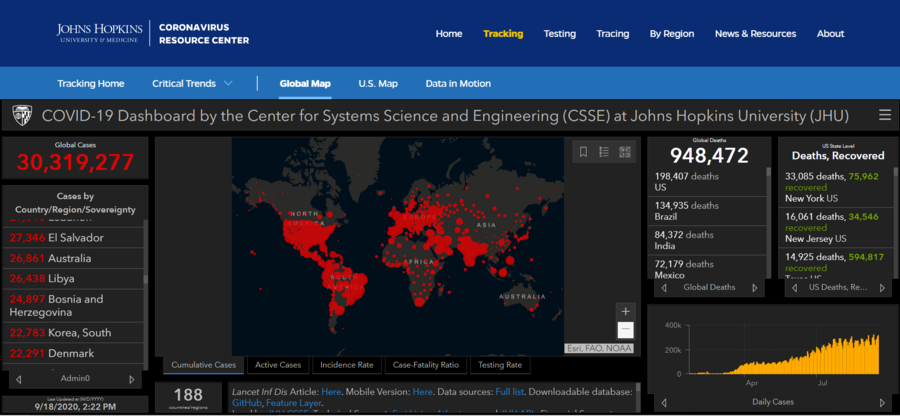
Is it true that COVID-19 is not a pandemic? No, That's not true: The rapid global spread of COVID-19 fits both the dictionary definition of pandemic and has also ticked enough of the boxes necessary for global and national public health officials to declare it a pandemic.
The claim was made in a broadcast by opinion columnist Alan Jones Sept. 16, 2020 on Sky News Australia (archived here). It was titled "Australians must know the truth - this virus is not a pandemic" and opened:
Sky News host Alan Jones says he has warned time and time again the political leaders who are the architects of this coronavirus response will not be able to escape the criticism that is now finding its way into the public place."
Click below to watch the video on YouTube:
Jones' statement was based on the report that an economist in the Victorian Department of Finance and Treasury, Sanjeev Sabhlok, resigned his job in order to speak out against the State of Victoria's management of the response to the COVID-19 outbreak. Jones, who in addition to hosting an opinion show on Sky News Australia, is a weekly columnist for the Daily Telegraph & The Australian, said "One question remains: how many others have been silenced across all arms of government. Jones called for a national advertising campaign to "tell the public the truth about the fact this virus is not a pandemic."
Here's how the Oxford Dictionary of Epidemiology, 4th edition, defines pandemic:
An epidemic occurring worldwide, or over a very wide area, crossing international boundaries and usually affecting a large number of people.
Here's how the Oxford English Dictionary makes the distinction between an epidemic and a pandemic:
A disease that quickly and severely affects a large number of people and then subsides is an epidemic: throughout the Middle Ages, successive epidemics of the plague killed millions...A disease that is continually present in an area and affects a relatively small number of people is endemic: malaria is endemic in (or to) hot, moist climates. A pandemic is a widespread epidemic that may affect entire continents or even the world...
As of Sept. 18, 2020, more than 948,000 people had died of COVID-19 worldwide. In Australia, more than 800 people had died as of Sept. 18, 2020 and there had been more than 26,000 cases in the island nation. The map that follows shows in red the distribution of cases across the globe. The pull-down menu of cases, on the left, has been set to show Australia's case total.
(Source: Johns Hopkins University Coronavirus Resource Center screenshot taken on Fri Sep 18 22:20 2020 UTC)
Here is how the Secretary General of the World Health Organization defined the case when announcing the WHO's declaration of a pandemic on March 11, 2020:
In the past two weeks, the number of cases of COVID-19 outside China has increased 13-fold, and the number of affected countries has tripled.
...
WHO has been assessing this outbreak around the clock and we are deeply concerned both by the alarming levels of spread and severity, and by the alarming levels of inaction.
We have therefore made the assessment that COVID-19 can be characterized as a pandemic.
Pandemic is not a word to use lightly or carelessly. It is a word that, if misused, can cause unreasonable fear, or unjustified acceptance that the fight is over, leading to unnecessary suffering and death.
...
We know that these measures are taking a heavy toll on societies and economies, just as they did in China.
All countries must strike a fine balance between protecting health, minimizing economic and social disruption, and respecting human rights.
Here is how Australia's Parliament defined its case for pandemic response:
On 18 March 2020 in response to the COVID-19 outbreak in Australia, the Governor-General declared that a human biosecurity emergency exists. The declaration gives the Minister for Health expansive powers to issue directions and set requirements in order to combat the outbreak. This is the first time these powers under the Biosecurity Act have been used.
The Biosecurity (Human Biosecurity Emergency) (Human Coronavirus with Pandemic Potential) Declaration 2020 was made under section 475 of the Biosecurity Act 2015 (Cth). The declaration states:
Human coronavirus with pandemic potential is an infectious disease:
(a) that has entered Australian territory; and
(b) that is fatal in some cases; and
(c) that there was no vaccine against, or antiviral treatment for, immediately before the commencement of this
instrument; and(d) that is posing a severe and immediate threat to human health on a nationally significant scale.


















